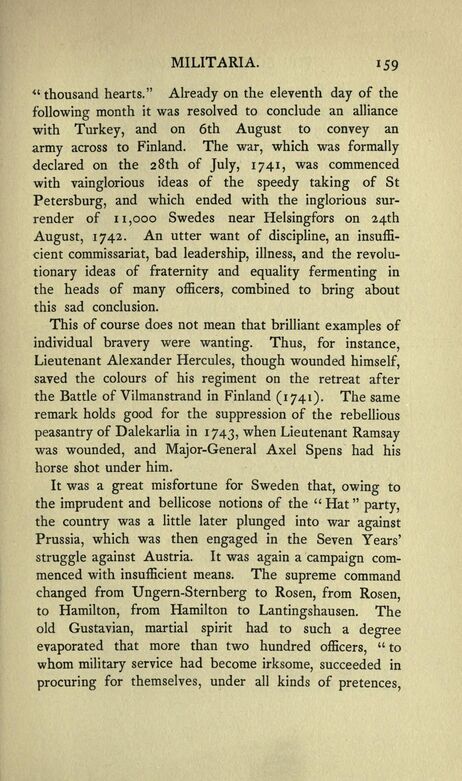
Full resolution (JPEG) - On this page / på denna sida - Sidor ...

<< prev. page << föreg. sida << >> nästa sida >> next page >>
Below is the raw OCR text
from the above scanned image.
Do you see an error? Proofread the page now!
Här nedan syns maskintolkade texten från faksimilbilden ovan.
Ser du något fel? Korrekturläs sidan nu!
This page has never been proofread. / Denna sida har aldrig korrekturlästs.
“ thousand hearts.” Already on the eleventh day of the
following month it was resolved to conclude an alliance
with Turkey, and on 6th August to convey an
army across to Finland. The war, which was formally
declared on the 28 th of July, 1741, was commenced
with vainglorious ideas of the speedy taking of St
Petersburg, and which ended with the inglorious
surrender of 11,000 Swedes near Helsingfors on 24th
August, 1742. An utter want of discipline, an
insufficient commissariat, bad leadership, illness, and the
revolutionary ideas of fraternity and equality fermenting in
the heads of many officers, combined to bring about
this sad conclusion.
This of course does not mean that brilliant examples of
individual bravery were wanting. Thus, for instance,
Lieutenant Alexander Hercules, though wounded himself,
saved the colours of his regiment on the retreat after
the Battle of Vilmanstrand in Finland (1741). The same
remark holds good for the suppression of the rebellious
peasantry of Dalekarlia in 1743, when Lieutenant Ramsay
was wounded, and Major-General Axel Spens had his
horse shot under him.
It was a great misfortune for Sweden that, owing to
the imprudent and bellicose notions of the “ Hat ” party,
the country was a little later plunged into war against
Prussia, which was then engaged in the Seven Years’
struggle against Austria. It was again a campaign
commenced with insufficient means. The supreme command
changed from Ungern-Sternberg to Rosen, from Rosen,
to Hamilton, from Hamilton to Lantingshausen. The
old Gustavian, martial spirit had to such a degree
evaporated that more than two hundred officers, “ to
whom military service had become irksome, succeeded in
procuring for themselves, under all kinds of pretences,
<< prev. page << föreg. sida << >> nästa sida >> next page >>